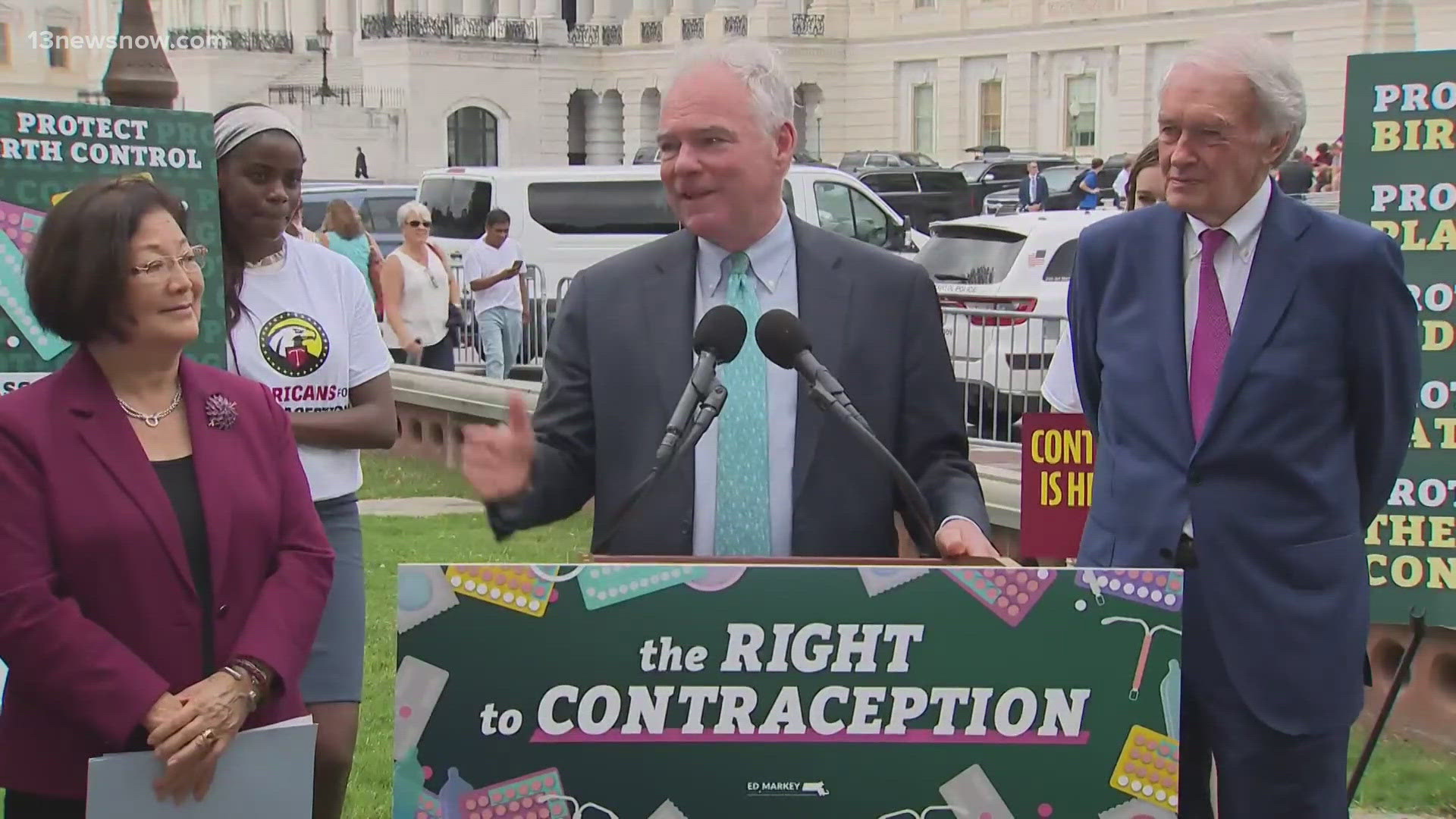NORFOLK, Va. — Senate Republicans voted down a measure that would ensure women have a right to contraception, a month after a similar measure was struck down in Virginia.
It also comes two years after the Supreme Court voted to overturn Roe v Wade.
Virginia Democratic Senators Mark Warner and Tim Kaine said they are disappointed by the vote, with only two Republicans voting yes on the Right to Contraception Act. However, they say they’re turning their attention to another bill they are cosponsoring protecting reproductive rights.
Senate Republicans argue the Right to Contraception Act was a political stunt, saying they believe in access to contraception but said the legislation was unnecessary.
Senate Democrats say it was about more than that.
"It basically established that a person has the right to access contraception and a provider has the right to provide contraception and the government can’t intrude upon that," said Kaine.
According to the Pew Research Center, the majority of both President Joe Biden and Former President Donald Trump supporters view the broad availability of birth control and in-vitro fertilization as a good thing.
"It was disappointing yesterday. People have said, ‘well was it a show vote?’ It was a show of whether you as a senator believe women in this country have a right to contraception," said Warner.
A similar measure, supported by Democratic Virginia Delegate Cia Price, was vetoed by Republican Governor Glenn Youngkin last month.
"We introduced this bill because everyone should have the full scope of available options for reproductive healthcare and family planning services," she said during a press conference before the Senate vote. "Contraception is critical for family planning and a variety of health conditions, including my own—polycystic ovarian syndrome. I could not even be here today without my IUD. I could not do the work of a delegate without my IUD and there are millions of Americans just like me who have no semblance of quality of life without our contraception."
Youngkin said he supports access to birth control but did not want to “trample on the religious freedoms of Virginians.”
Now, Warner and Kaine are turning their attention to the Right to IVF Act that will likely make it to the Senate floor for a vote next week.
"People deserve the ability to make their own reproductive healthcare decisions and their own decisions about when and how to start a family," said Kaine.
According to the two Virginia Senators, the Right to IVF Act includes provisions from four bills:
- The Access to Family Building Act:
- Establish a statutory right for individuals to access, providers to provide, and insurers to cover IVF and ART services.
- Authorize the U.S. Department of Justice to enforce these statutory rights.
- Authorize a private right of action to allow adversely affected parties to sue.
- The Veteran Families Health Services Act of 2023:
- Permanently authorize and enhance fertility treatment and counseling options for veterans and servicemembers, expand family-building assistance, improve eligibility rules, and strengthen research on servicemembers' and veterans' long-term reproductive health.
- Expand servicemembers’ access to fertility services before deployment to a combat zone or hazardous duty assignment and after an injury or illness.
- The Access to Fertility Treatment and Care Act:
- Increase the affordability of fertility care, including IVF, by requiring employer-sponsored insurance plans and other public insurance plans, to cover fertility treatments.
- Standardize baseline of high-quality fertility treatment coverage under private health insurance plans and protect Americans against excessive out-of-pocket costs.
- The Family Friendly FEHB Fairness Act:
- Promote the standardization and widespread availability of affordable fertility treatment coverage under employer-sponsored health insurance plans.
- Require insurance carriers that participate in the Federal Employees Health Benefit (FEHB) Program to cover ART, including IVF treatments.
It comes after Alabama’s Supreme Court ruled frozen embryos can be considered children under state law… but the state later created a law providing legal protections for clinics.
"I believe very strongly that women in America, women in Virginia ought to have the freedom to decide how and when to start a family," said Warner.

